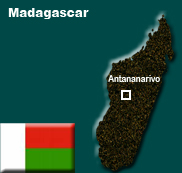Tense calm in Madagascar after military attack on presidency
 Antananarivo - A tense calm reigned in Madagascar's capital, Antananarivo, on Tuesday after mutinous troops cranked up the mounting pressure on President Marc Ravalomanana to step down by storming one of his palaces Monday evening.
Antananarivo - A tense calm reigned in Madagascar's capital, Antananarivo, on Tuesday after mutinous troops cranked up the mounting pressure on President Marc Ravalomanana to step down by storming one of his palaces Monday evening.
Scores of troops supported by three tanks burst through the gates of the president's administrative palace in the centre of the capital after night fell Monday, reportedly firing grenades and shots as they advanced.
The palace was apparently empty at the time. The president is holed up in his residential palace, about 14 kilometres south of the city, with hundreds of his supporters barring the access road.
The army leadership has been taken over by mutineers. The troops say they no longer want to be used by the president to quell opposition demonstrations following the killing of dozens of unarmed demonstrators since January.
Over 100 people have been killed in seven weeks of street protests that began in protest over controversial spending and a crackdown on some basic rights, like freedom of the press.
Despite pledges to remain neutral, the dissident troops, who are believed to be in the majority, appear to support opposition leader, Andry Rajoelina, who has unilaterally declared himself Madagascar's leader.
The new army chief of staff, André Ndriarijaona, said the only way out of the stand-off between the government and opposition was for Ravalomanana to resign immediately.
"I will no longer accept that one person can cause nationwide unrest," he was quoted by local newspapers Tuesday as saying.
On Monday, troops were patrolling the area in the city around the administrative palace and nearby central bank. But people were cautiously going about their business.
The president refuses to step down, proposing instead a referendum on whether he should complete his second five-year term, which expires in 2011.
Rajoelina has rejected the referendum proposal and says the president no longer has the people's support.
The African Union has condemned what it calls Rajoelina's attempted coup d'etat, while the European Union has said it will not recognize a government that comes to power through force. (dpa)